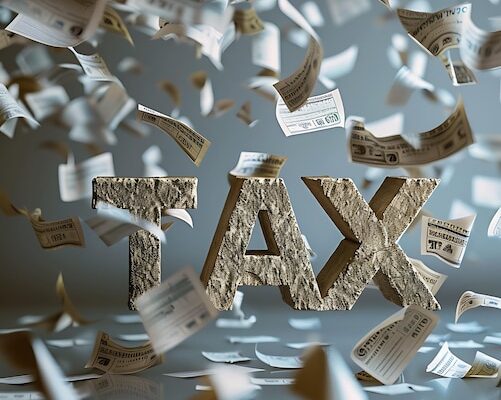“Which Side of the Financial Divide Are You On?” An In-Depth Look at Personal Finance and Wealth Inequality
Introduction
The gap between the rich and the poor is a contentious issue in modern society. Personal finance/” target=”_blank” rel=”noopener”>finance
plays a significant role in this divide, with some individuals amassing vast wealth while others struggle to make ends meet. In this article, we will delve deeper into the world of personal finance and explore the causes and consequences of wealth inequality.
Personal Finance: The Basics
Before discussing wealth inequality, it is essential to understand the basics of personal finance/” target=”_blank” rel=”noopener”>finance
. Personal finance refers to the management of an individual’s financial resources. It includes budgeting, saving, investing, and managing debt. Effective personal finance management can help individuals build wealth and secure their future.
Wealth Inequality: The Problem
Wealth inequality is the unequal distribution of wealth among individuals and households. According to a link, the top 1% of the world’s population owns more than half of the total wealth. The bottom 50% own less than 1%. This trend is not unique to developing countries; it is also prevalent in developed economies.
Causes of Wealth Inequality
Several factors contribute to wealth inequality, including:
- Inheritance: Wealth is often passed down from generation to generation. This can lead to a concentration of wealth in the hands of a few families.
- Education: Lack of access to quality education can limit opportunities for wealth accumulation.
- Occupation: Certain occupations, particularly those in the technology sector, offer high salaries and opportunities for significant wealth creation.
Consequences of Wealth Inequality
Wealth inequality has several consequences, including:
- Social Mobility: Wealth inequality can limit social mobility and perpetuate poverty.
- Economic Growth: Wealth inequality can negatively impact economic growth by reducing consumer spending and limiting the tax base.
Conclusion
Wealth inequality is a complex issue with far-reaching consequences. By understanding the basics of personal finance and exploring the causes and consequences of wealth inequality, we can begin to address this problem and create a more equitable society for all.
I. Introduction
Personal finance refers to the set of skills and practices managed by individuals and households to budget, save, invest, and manage debts. It is a crucial aspect of everyday life that helps us make informed decisions regarding our money matters. Wealth inequality, on the other hand, refers to the unequal distribution of wealth among individuals and households within a society. This issue has gained significant importance in recent times due to its far-reaching implications on economic and social stability.
Brief explanation of personal finance and its importance in everyday life
Personal finance is the foundation upon which we build our financial future. It encompasses various aspects such as budgeting, saving, investing, insuring, and banking. By understanding and applying the principles of personal finance, we can effectively manage our income, reduce debt, increase savings, and plan for future financial needs like retirement or unexpected emergencies.
Introduce the concept of wealth inequality and its significance
Wealth inequality refers to the disparity in the distribution of financial resources among different individuals or groups within a society. This gap can lead to various social, economic, and political consequences. Understanding wealth inequality is essential as it helps us grasp the underlying causes, effects, and potential solutions to this complex issue.
Importance of understanding where you stand financially and why it matters
Knowing your financial standing is vital because it enables you to make informed decisions about your future. By understanding where you stand financially, you can identify areas for improvement, create realistic goals, and develop a plan to achieve them. Moreover, being financially literate empowers you to engage in informed conversations about wealth inequality and advocate for policies that promote greater financial inclusion and equality.
Understanding Personal Finance
Basic components:
Personal finance is the management of one’s money to achieve financial goals and maintain a stable financial situation. The following are the basic components that make up personal finance:
Income:
Income is the earnings from all sources, including salary or wages, interest, dividends, and rental income. A stable income is crucial as it provides the foundation for managing expenses, saving, and investing.
Expenses:
Expenses are the outflows of money. They can be classified into fixed (mortgage, rent, insurance) and variable (utilities, groceries, entertainment). Essential expenses must be paid before considering non-essential ones. Creating a budget is essential to ensure expenses do not exceed income.
Savings:
Savings is the portion of income that is set aside for future use. It’s important to have an emergency fund to cover unexpected expenses, plan for retirement savings, and work towards long-term goals.
Investments:
Investments involve putting money into assets with the expectation of earning a return. Types include stocks, bonds, mutual funds, real estate, and more. Diversification is important to spread risk across various asset classes.
5. Debt:
Debt is borrowed money that needs to be repaid with interest. Understanding interest rates, types (secured vs. unsecured, good debt like education vs. bad debt like credit cards), and strategies for paying off debt (debt snowball method, debt avalanche method) is essential.
6. Credit:
Credit is the ability to borrow money or buy goods and services now and pay later. Building credit, using it responsibly, and maintaining a good credit score is essential for securing loans with favorable terms.
I Wealth Inequality and Its Causes
Definition and measurement of wealth inequality
Wealth inequality refers to the disparities in the distribution of financial assets, property, and resources among individuals or groups within a society. Unlike income, which represents the earnings from wages, profits, or interest over a given period, wealth is a static measure of an individual’s net worth. Wealth is more closely related to the concept of economic power and long-term financial security. According to various studies, wealth inequality has been on the rise in many parts of the world.
Wealth vs. income: difference in significance, trends, and consequences
Although both wealth and income are essential aspects of economic well-being, they differ significantly in terms of their significance, trends, and consequences. Income is the money a person earns in a given period, while wealth represents the total value of their assets. Wealth inequality has been increasing more rapidly than income inequality in many countries, indicating that the gap between the rich and the poor is widening. The consequences of this trend can be far-reaching, affecting economic growth, political power, and social mobility.
Global trends in wealth distribution and its impact on society
Concentration of wealth among the top percentile
According to various reports, the top 1% of global population owns more than half of the total wealth. This trend has been accelerating in recent decades, with the richest individuals experiencing exponential wealth growth while the bottom 90% have seen little to no improvement.
Effects on economic growth, political power, and social mobility
The growing wealth inequality has significant implications for the economy, politics, and society. Economically, it can hinder economic growth by reducing consumer spending and creating income inequality, which can lead to social unrest and political instability. Politically, wealth inequality can give the wealthy undue influence over policy decisions, further exacerbating inequality. Socially, it limits opportunities for upward mobility and can lead to a widening social divide.
Bridging the Financial Divide: Strategies for Improving Your Financial Situation
Education and career development:
Investing in yourself is one of the most valuable investments you can make. Education and career development are key components in improving your financial situation. Seeking new opportunities through advanced degrees, certifications, or vocational training can lead to higher-paying jobs and greater financial security. Lifelong learning is essential in today’s rapidly changing world, as it allows individuals to adapt to new technologies and industries.
Budgeting and debt management:
Creating a budget is the foundation for managing your finances effectively. Prioritizing expenses and establishing a spending plan enables you to allocate funds towards essential needs, while also allowing for discretionary items. Strategies such as the 50/30/20 rule can help guide your budgeting decisions. Paying off debt should be a top priority, and there are several methods for doing so effectively, including the debt snowball and the debt avalanche approaches.
Saving and investing:
Starting to save and invest early is crucial for building long-term wealth. Setting financial goals, such as retirement, emergency funds, or educational expenses, can help guide your saving efforts. Understanding your risk tolerance is essential when it comes to investing, as it determines the type of investments that are suitable for you.
Building wealth through passive income, entrepreneurship, and real estate investments:
Passive income streams can provide an additional source of revenue, helping to increase your overall wealth. This can include rental properties, royalties from creative works, or dividends from stocks. Entrepreneurship is another viable option for building wealth, offering the potential for unlimited earnings through business ownership. Real estate investments have long been a popular choice for generating passive income and wealth accumulation.
Policy Solutions to Address Wealth Inequality
Government Initiatives:
Government initiatives play a crucial role in addressing wealth inequality. One such initiative is progressive taxation, which redistributes wealth from the wealthy to the less fortunate. Another approach is the implementation of a universal basic income (UBI), which ensures that every individual receives a minimum income, regardless of their employment status or wealth. Furthermore, affordable housing programs can help bridge the gap between the rich and the poor by making homes accessible to those who cannot afford them otherwise. Lastly, education policies that focus on equal opportunity and accessibility can help reduce wealth inequality by providing a level playing field for all students, regardless of their socio-economic background.
Corporate and Societal Responsibility:
Corporations and society also have a role to play in addressing wealth inequality. Fair wages that reflect the value of labor are essential to ensuring that everyone earns a living wage. Affordable healthcare is another crucial issue, with access to quality healthcare being a significant determinant of wealth. Lastly, ethical business practices that prioritize the wellbeing of employees and the community can help reduce income inequality by ensuring that everyone benefits from economic growth.
Personal Actions:
Individuals can also take personal actions to help address wealth inequality. Volunteering and giving to charities are two such actions that can make a difference in people’s lives. Advocating for change in your community, whether it be through activism or lobbying your representatives, is another way to contribute to the fight against wealth inequality. By taking these actions, we can all do our part to create a more equitable society for all.
VI. Conclusion
Personal finance is more than just managing your income and expenses; it’s about building wealth, securing your future, and reducing financial stress. However, it’s essential to acknowledge the reality of
wealth inequality
, which can significantly impact individuals’ financial opportunities and outcomes. The wealth gap between the rich and the poor continues to widen, creating a complex web of economic challenges.
Encouragement to take action
It’s easy to feel overwhelmed or powerless when confronted with the issue of wealth inequality. However, focusing on what we can control – our own financial situation – is a crucial step towards creating positive change. By educating ourselves about personal finance principles and implementing sound money management practices, we can take control of our financial destiny and build a more secure future.
Call to action: engaging in conversations, advocating for change, and making personal improvements
We must not ignore the larger issue of wealth inequality. Instead, we should engage in open and honest conversations about this topic, listening to diverse perspectives and seeking solutions that promote financial inclusion and equality. As individuals, we can also advocate for policies that address wealth inequality and make personal improvements to our own financial situations. By taking action and making a difference in our lives, we contribute to creating a more equitable and prosperous society for all.




